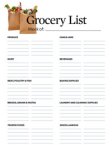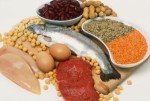We all have different patterns of hunger, but if you eat three healthy meals and plan 2-3 snacks to eat when your body needs the energy, you will always know another meal/snack is coming and not be so tempted to overeat “to hold you over”. Make sure to plan ahead for those crazy days and keep nutritious snack foods in small containers. A trigger for overeating is getting too hungry, but you can prevent that with pre-planning and a good grocery list. What can you add to this week’s grocery list for snacks?
Categories
-
Join 37 other subscribers
Archives
- April 2012
- March 2012
- February 2012
- January 2012
- December 2011
- November 2011
- October 2011
- September 2011
- August 2011
- July 2011
- June 2011
- May 2011
- April 2011
- March 2011
- February 2011
- January 2011
- December 2010
- November 2010
- October 2010
- September 2010
- August 2010
- July 2010
- June 2010
- May 2010
- April 2010
- March 2010
- February 2010
- January 2010
- December 2009
- November 2009
- September 2009
- August 2009
- July 2009
- June 2009
Follow Us
Tweets by janhealthcoach- air-purifier anger anxiety appetite aromatherapy bad day beer calm calories comfort cooking deep breathing deprivation diet dieting dog eating eating healthy emotional eating emotional hunger emotions Energy exercise food friendship gratitude happiness happy health healthy healthy aging healthy food hunger hungry insomnia journaling junk food laughter maintaining weight massage meditation melatonin memory metabolism mind mindful mindful eating mood nutrition organic food overeating pain pain relief perfectionist pet plants portion control portion size positive problem solving relax sleep Snacking snacks stress stress management stress relief support touch veggies visualization weight weight loss worry yoga
















